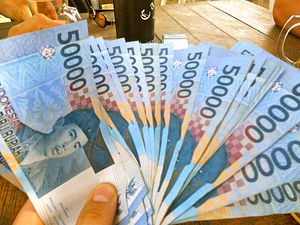From Hong Kong to Cambodia and Thailand to Indonesia and across to the Philippines, governments are this week marking the political convulsions and financial turmoil that swept the region 20 years ago, and reshaped its destiny forever.
Hong Kong held the initial spotlight, with the July 1 handover from Britain to China. Then, just one day later, that focus shifted to Thailand where ridiculously high debt finally forced the authorities to float their currency, precipitating the Asian Financial Crisis.
The political uncertainty and financial contagion were an unmitigated a disaster for a region that prided itself on the Asian Tiger economies, which had emerged from obscurity and were challenging the traditional dominance of the West in the financial world.
It was a perfect storm made all the worse by Cambodian strongman Hun Sen, who, in the same week, ousted an elected prime minister in a violent coup. Dozens of people were killed, many of them officers and soldiers loyal to then co-Prime Minister Prince Norodom Ranariddh, a position he held in a power-sharing arrangement with Hun Sen.
It was a dreadful look. Not since the Vietnam War ended had this part of the world commanded so much attention.
In finance, foreign debt-to-GDP ratios spiked to past 180 percent, in some countries forcing central banks to raise interest rates accordingly. Bankruptcies on an unprecedented level followed.
Thailand and Malaysia were severely punished. In Indonesia, where ethnic Chinese were blamed for the fiscal chaos, riots erupted, businesses were trashed, and people killed. South Korea bore a heavy brunt as excessive debt caused regional currencies to tumble. Stock markets followed suit as did Hong Kong, where a new, brash Chinese leadership struggled after being caught unaware. Demonstrations turned ugly.
It was not until the International Monetary Fund stepped in with reform packages and bailouts that confidence started to return and the public and markets began to settle. Particularly important was the Chiang Mai Initiative; a fund established by ASEAN, China, Hong Kong, Japan, and South Korea to manage short term liquidity issues across East Asia and help avert any repeat of the 1997-98 crisis.
For politicians, businessmen, and locals, there was a sense of loss. Combined, these events marked the end of an era when credible magazines, like the now defunct Asiaweek, referred to Southeast Asia as an emerging “utopia” with Asian values.
In Cambodia, debate persists about whether the July 5-7 showdown was actually a coup, or simply one of the last major battles fought in that country’s decades-long civil war. Hun Sen, now the region’s longest serving leader, likes to remind his audience that he did them a favor by deleting his political opponents from office. His authoritarian style remains a benchmark for bad behavior, a target for human rights groups, and a sad example of leadership in the region.
Since then, a coup d’état in Thailand, financial and political scandals in Malaysia, and a war on drugs in the Philippines have ensured that Southeast Asia’s unsavory reputation remains largely intact.
Hong Kong has financially recovered, but politically it is still in a state of flux. Its return to China has not gone smoothly after Beijing broke its promise and blocked the territory’s transition to full democracy, leading to unprecedented calls for independence by some in the pro-democracy camp.
It is a safe bet that these grievances will not be addressed by Chinese leader Xi Jinping while on his first visit to Hong Kong since becoming president in 2013, to mark the handover’s 20th anniversary.
Similarly, speeches by central bankers about how they shored up finances in the heat of the financial crisis and saved their economies from ruin are unlikely to tackle current issues, like the unwarranted printing of money, as much an issue now as debt was two decades ago.
By any measure, ASEAN and its neighbors have struggled to recapture the halcyon days of the 1980s and early 1990s. The current spate of anniversaries should serve as an unwanted reminder of a time when politics and economics were vibrant and the future seemed assured.
Luke Hunt can be followed on Twitter @lukeanthonyhunt

































